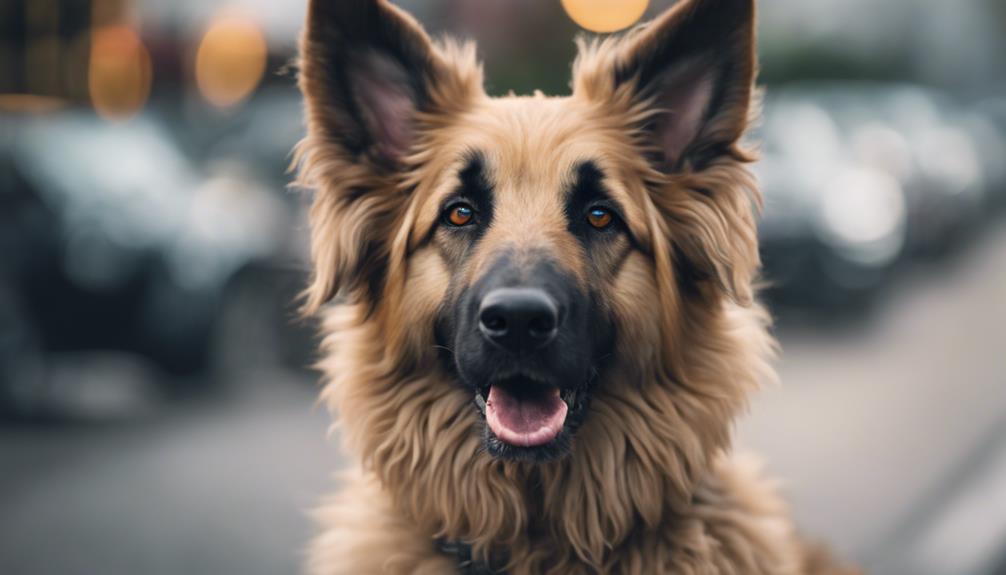🐾 Paw-some Partnership Alert! 🐾
As a pack of German Shepherd enthusiasts at MixGermanShepherd.com, we're always sniffing out the best products for our furry friends. Guess what? When you fetch something from Amazon through our links, we earn a little treat! 🦴
Have you ever wondered what happens when the loyalty of a German Shepherd meets the intelligence of a Poodle? The resulting Shepadoodle breed is a fascinating mix that offers much more than meets the eye. From their unique physical characteristics to their exceptional temperament and hypoallergenic qualities, there are various aspects that set this designer breed apart. Explore further to uncover the distinct traits that make the Shepadoodle a standout choice for those seeking a loyal and intelligent canine companion.
Key Takeaways
- Shepadoodles combine intelligence and hypoallergenic coats from German Shepherds and Poodles.
- Their loyal, playful, and protective nature makes them exceptional family pets.
- Genetic screening enhances hypoallergenic traits and minimizes hereditary health risks.
- Early socialization and consistent training are vital for managing their intelligence and energy levels.
Breed Origin and History

The Shepadoodle breed's origins can be traced back to the early 2000s when breeders intentionally combined the distinct characteristics of German Shepherds and Poodles. This deliberate pairing led to the creation of what is known as a designer dog breed, the German Shepherd Poodle Mix, also commonly referred to as the Shepadoodle. One of the primary objectives behind developing this hybrid was to capitalize on the intelligence and hypoallergenic coat qualities inherent in both parent breeds.
As a result of this selective breeding process, Shepadoodles exhibit a remarkable blend of traits inherited from their German Shepherd and Poodle lineage. The medium to large-sized stature and sturdy build of Shepadoodles are characteristic features derived from their German Shepherd ancestors. Additionally, the hypoallergenic coat, a sought-after attribute for many dog owners with allergies, is a prominent quality passed down from the Poodle side of their heritage.
The intentional combination of the German Shepherd and Poodle breeds has resulted in the Shepadoodle becoming a popular choice for families seeking a canine companion that is not only intelligent but also versatile. This unique mix of traits has cemented the Shepadoodle's position as a favored breed among those looking for a loyal and well-rounded pet.
Unique Physical Characteristics
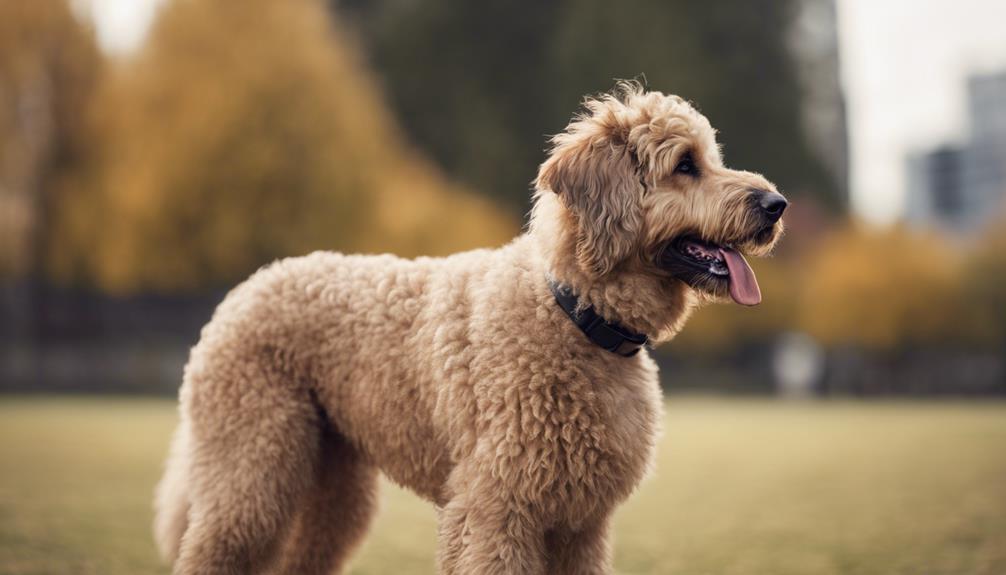
With a mix of German Shepherd and Poodle lineage, Shepadoodles present a distinctive array of physical attributes that set them apart from other breeds. When considering the unique physical characteristics of the Shepadoodle breed, their coat, color, and texture play significant roles:
- Coat Variety: Shepadoodles exhibit a wide range of coat textures, from the dense and rough fur akin to a German Shepherd to the soft and curly coat similar to a Poodle. This diversity adds to their charm and uniqueness, making each Shepadoodle visually distinct.
- Color Spectrum: The coat colors of Shepadoodles are equally diverse, encompassing shades of black, brown, cream, gray, white, and even bicolor patterns. These hues are inherited from their German Shepherd and Poodle parents, resulting in a striking array of color combinations that set Shepadoodles apart.
- Texture Blend: The texture of a Shepadoodle's coat can vary greatly based on their lineage. Some may have a more wiry texture resembling the German Shepherd, while others may possess a softer, more hypoallergenic coat reminiscent of the Poodle. This blend of textures contributes to the individuality of each Shepadoodle's appearance, making them a visually captivating breed.
Temperament and Personality Traits
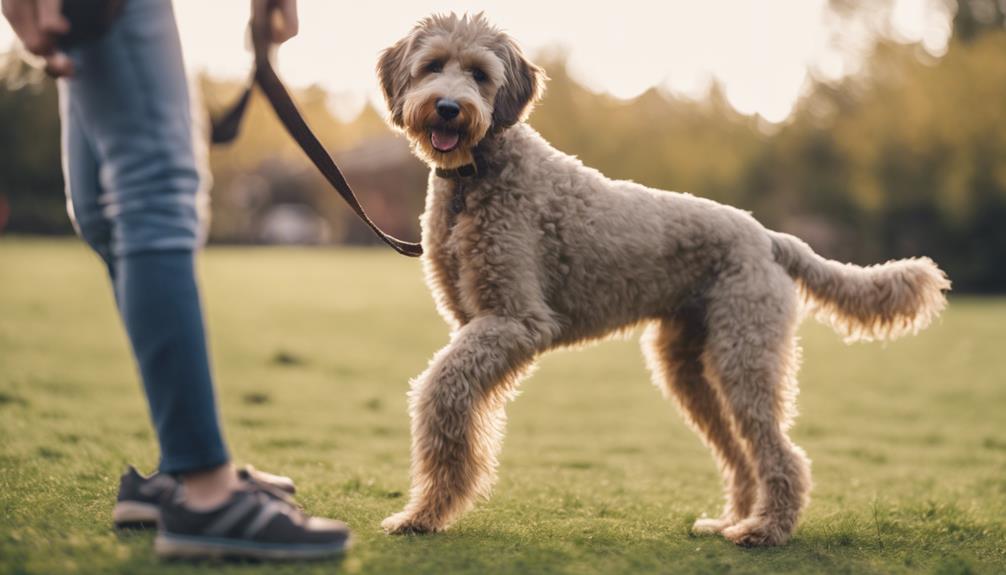
Exploring the temperament and personality traits of Shepadoodles reveals a fascinating blend of intelligence, loyalty, and affection inherited from their German Shepherd and Poodle lineage. This mix results in a dog that is not only highly trainable and responsive but also deeply connected to its family. Shepadoodles exhibit a playful and friendly nature, making them loving and devoted companions to all household members. Their eagerness to please makes them ideal for positive reinforcement training methods, ensuring they are obedient pets for their owners.
Socialization plays a significant role in shaping the Shepadoodle's confidence and behavior. Early exposure to various environments and interactions is crucial in developing a well-rounded and confident companion. Their versatile, bold, and protective traits make Shepadoodles excellent family pets and loyal guardians. The combination of these characteristics from both parent breeds results in a dog that is not only intelligent and trainable but also loving and protective.
Hypoallergenic Qualities
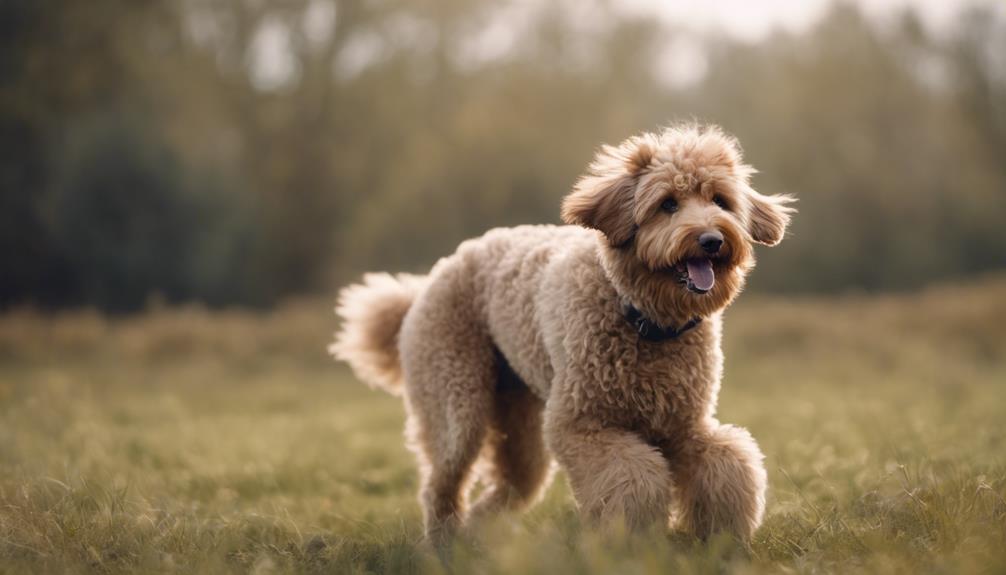
Incorporating genetic techniques can enhance the hypoallergenic qualities of Shepadoodles by selectively breeding for reduced shedding and allergenic dander. When considering the hypoallergenic traits of Shepadoodles, breeders focus on specific breeding practices to achieve desired outcomes:
- F1 Shepadoodles and Hypoallergenic Traits**: The first generation of Shepadoodles, known as F1, may exhibit varying levels of hypoallergenic qualities due to the inheritance of coat traits from their German Shepherd and Poodle parents. This variability makes predicting hypoallergenic properties challenging for this generation.
- Backcrossing for Enhanced Hypoallergenic Qualities: Breeders often opt for backcrossing F1 Shepadoodles with a Poodle (F1B) to reduce shedding and allergenic dander, enhancing the hypoallergenic characteristics. This deliberate breeding strategy aims to create Shepadoodles with more consistent hypoallergenic traits.
- Continual Improvement in Subsequent Generations**: Through subsequent generations like F2B and F3B, breeders can further refine the hypoallergenic qualities of Shepadoodles by decreasing German Shepherd traits while increasing hypoallergenic properties. This gradual refinement process allows for the development of Shepadoodles with enhanced hypoallergenic features over time.
To ensure that potential owners with allergies can make informed decisions, reputable breeders conduct DNA testing to predict shedding levels and hypoallergenic traits in Shepadoodles. Engaging in discussions with knowledgeable breeders is crucial for understanding the lineage and potential hypoallergenic qualities of Shepadoodles.
Protective Instincts
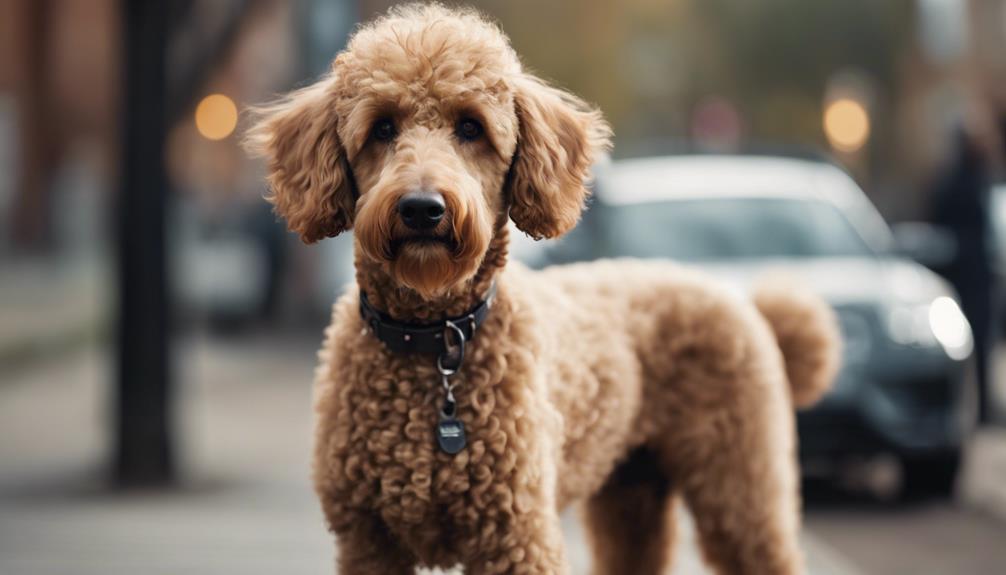
Shepadoodles genetically inherit protective instincts from their German Shepherd parent, contributing to their natural alertness and watchful demeanor. This inherent trait is deeply rooted in their genetic makeup, making them predisposed to being loyal and protective companions. The combination of the German Shepherd's protective nature and the Poodle's intelligence results in a dog that is not only watchful but also capable of assessing situations with a high level of cognitive understanding.
To better understand the protective instincts of Shepadoodles, let's break down some key characteristics in the table below:
| Characteristic | Description | Importance |
|---|---|---|
| Loyalty | Shepadoodles are fiercely loyal to their families, forming strong bonds that drive their protective nature. | Essential for forming a strong protective bond. |
| Alertness | Their keen sense of awareness allows them to detect potential threats promptly, enabling quick responses. | Crucial for identifying and addressing dangers. |
| Territorial Behavior | Shepadoodles may exhibit territorial behavior when protecting their home and loved ones from perceived threats. | Helps in establishing boundaries and providing security. |
| Protective Instincts | These instincts drive their vigilant behavior, making them excellent watchdogs and reliable guardians. | Essential for fulfilling their role as protectors. |
Understanding the genetic predisposition of Shepadoodles towards protective instincts can assist owners in nurturing these qualities effectively. Proper training and socialization play a crucial role in harnessing these instincts positively, ensuring a well-rounded and dependable pet.
Exercise and Activity Needs
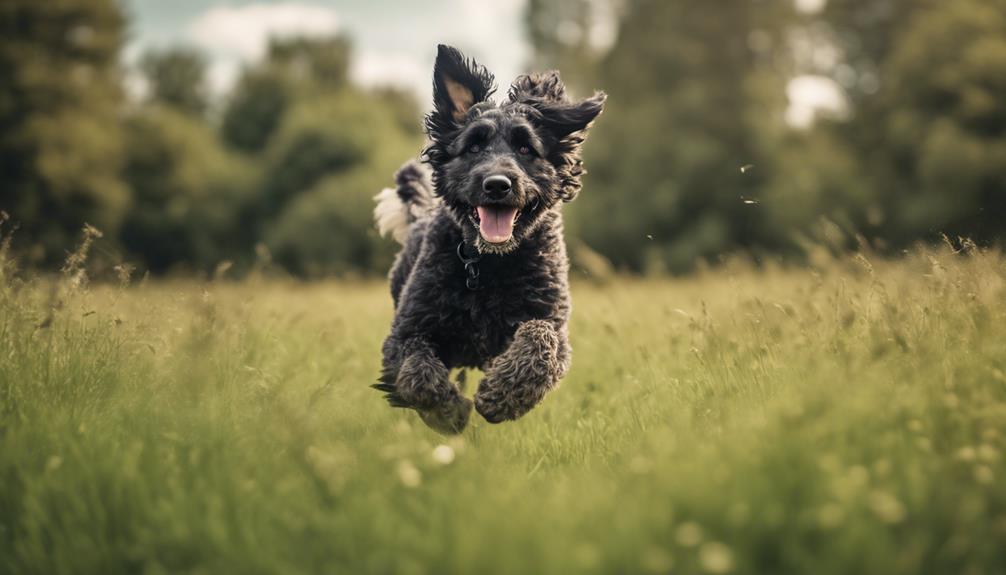
To meet the exercise and activity needs of the Shepadoodle breed, ensuring consistent daily physical engagement is imperative for their overall well-being and health maintenance. Shepadoodles are a high-energy hybrid mix that requires substantial exercise to thrive. Here's what you need to know:
- Daily Exercise Requirement: Shepadoodles need at least 1-2 hours of vigorous exercise each day to remain healthy and content. This level of activity helps in burning off excess energy, promoting cardiovascular health, and preventing behavioral issues that may arise from pent-up energy.
- Ideal Activities: Engage your Shepadoodle in activities like running, hiking, and swimming to cater to their high energy levels effectively. These exercises not only provide physical stimulation but also mental enrichment, contributing to their overall well-being.
- Obesity Prevention: Regular exercise is crucial for Shepadoodles to prevent obesity and maintain optimal health. Lack of physical activity can lead to weight gain, which may result in various health issues such as joint problems and decreased lifespan.
Training and Socialization Tips
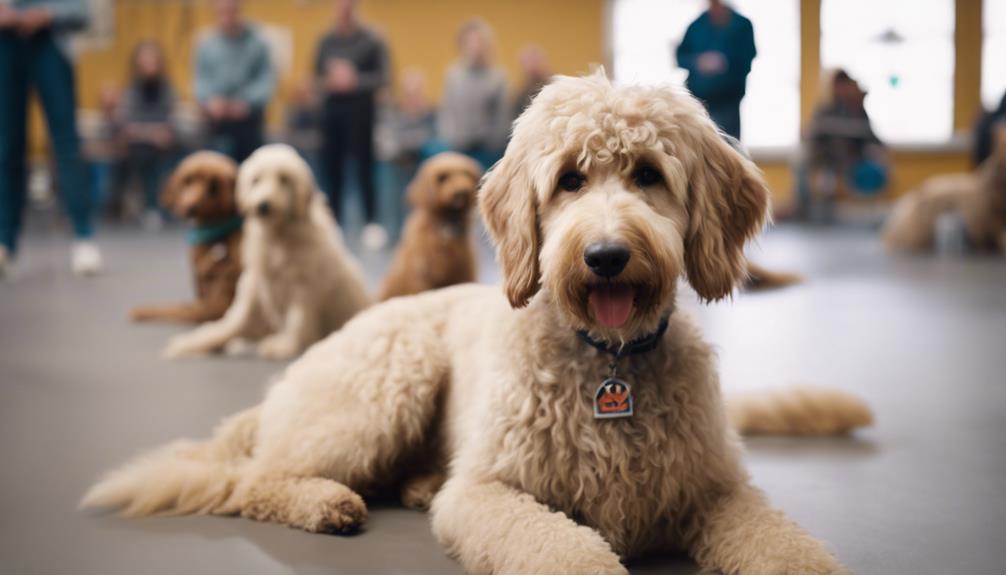
Considering the exercise requirements addressed in the previous section, effective training and socialization are vital components in shaping the behavior and temperament of the Shepadoodle breed. Shepadoodles, with their high intelligence and eagerness to please, respond well to positive rewards-based training methods. This approach helps channel their energy positively and prevents behavioral issues. Socialization plays a crucial role in the development of Shepadoodles, as early exposure to various environments, people, and animals helps them build confidence and learn appropriate social behavior.
To ensure successful training, it is recommended to limit training sessions to avoid overwhelming the Shepadoodle. Seeking guidance from experienced trainers can provide valuable insights and techniques tailored to this breed's specific needs. Patience and consistency are key when training Shepadoodles, as they thrive on routine and clear expectations.
When socializing Shepadoodles, special attention should be paid to interactions with children. Supervision is essential to ensure that the dog behaves respectfully and safely around youngsters. This breed has a protective nature, so training should focus on preventing potential aggression and overprotectiveness through positive reinforcement techniques. By following these training and socialization tips, you can help your Shepadoodle become a well-rounded and well-behaved companion.
Grooming Requirements
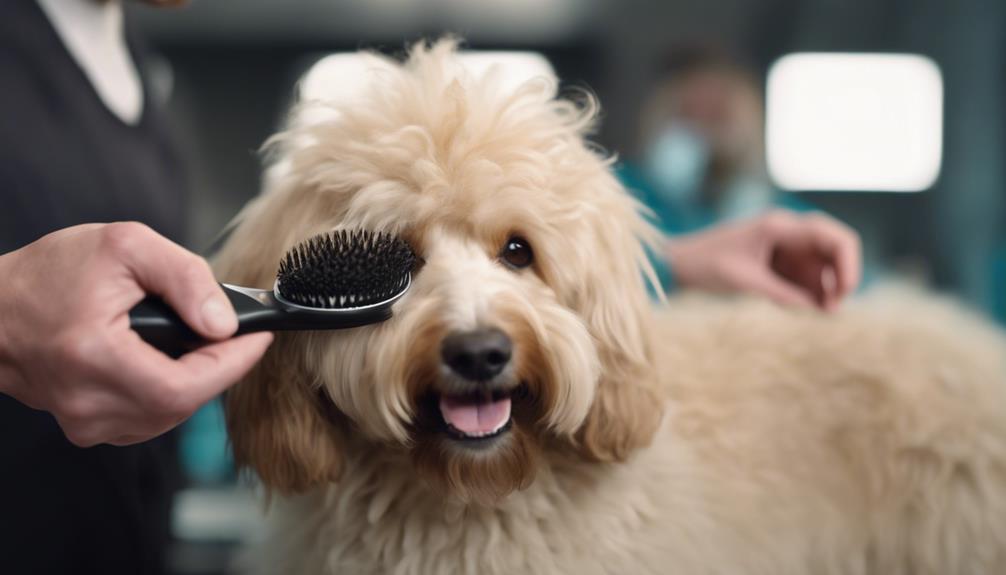
To maintain the Shepadoodle's coat, you should brush it regularly to prevent matting, as the specific grooming needs can vary depending on the coat type inherited from its parents. Shedding in Shepadoodles is common, so it is crucial to groom them frequently to manage loose hair effectively. Ensuring proper ear cleaning and nail trimming will contribute to the overall well-being and comfort of your Shepadoodle.
Coat Care Tips
Regular brushing is crucial for maintaining the varying coat types of Shepadoodles, from curly to dense, to prevent matting. When caring for your Shepadoodle's coat, consider these tips:
- Tailored Care: Grooming needs may vary depending on the lineage and specific coat type of your Shepadoodle, requiring customized care.
- Coat Colors: Shepadoodles come in a range of colors including black, brown, cream, gray, white, and bicolor patterns, each needing specific grooming techniques tailored to the coat color.
- Overall Grooming: In addition to brushing, regular ear cleaning and nail trimming are essential tasks to uphold your Shepadoodle's health and comfort. Remember, bathing with mild dog shampoo every two to three months helps maintain a clean and healthy coat.
Shedding Management Strategies
For effective shedding management strategies in Shepadoodles, focus on understanding the specific coat type of your dog to tailor grooming routines for optimal results. Shepadoodles exhibit a range of coat types, from low-shedding curly coats to dense, shedding coats. Regular brushing and grooming are essential for managing shedding in Shepadoodles with longer, denser coats. Those with more Poodle lineage typically shed less and may offer a more hypoallergenic option compared to those with more German Shepherd traits. Grooming needs for Shepadoodles encompass nail trimming, ear cleaning, and coat maintenance to effectively control shedding. By comprehending your Shepadoodle's distinct coat type, you can customize grooming practices to reduce shedding and uphold the health of their coat.
Grooming Frequency Recommendations
Shepadoodles with medium-length coats benefit from consistent grooming to prevent matting and tangling. When it comes to grooming frequency recommendations for your Shepadoodle, consider the following:
- Regular Brushing: Brush your Shepadoodle once a week to every other week to keep their coat free from tangles and matting.
- Grooming Frequency: Aim for grooming sessions every 1-2 weeks to maintain your Shepadoodle's coat in top condition.
- Ear Cleaning: Regularly clean your Shepadoodle's ears to prevent ear infections and maintain their ear health.
Common Health Issues
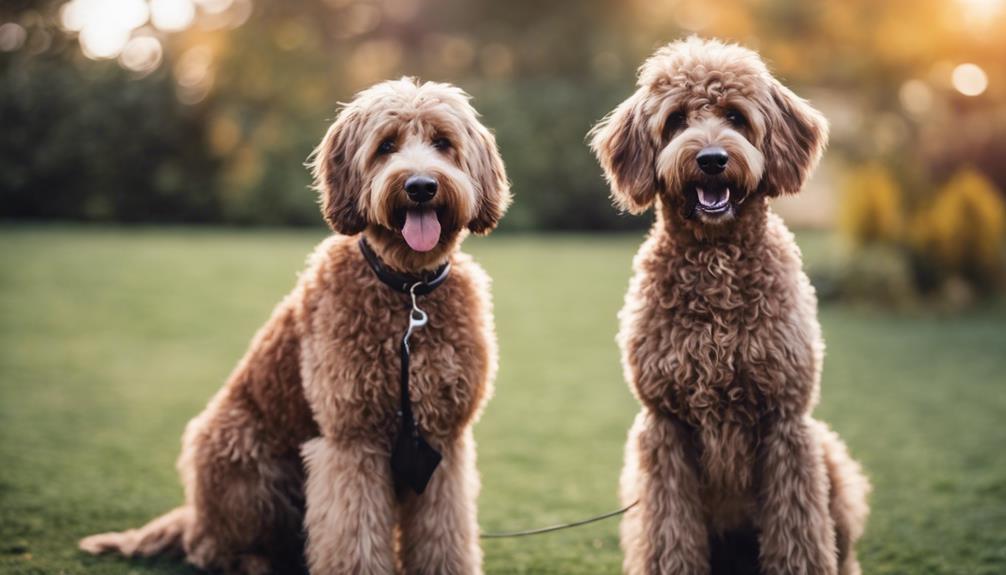
To effectively manage the common health issues in Shepadoodles, proactive genetic testing on parent dogs is essential for early detection and prevention. Hip dysplasia, a condition where the hip joint doesn't develop properly, is a primary concern in Shepadoodles due to their German Shepherd lineage. Genetic testing can help identify the predisposition to hip dysplasia, enabling preventive measures to be taken. Progressive retinal atrophy (PRA), a degenerative eye disorder leading to blindness, is another prevalent issue in Shepadoodles. Genetic testing for PRA can aid in determining the risk of developing this condition and allow for appropriate monitoring and care.
Arthritis, epilepsy, and perianal fistula are also common health issues in Shepadoodles that can impact their quality of life. Regular health check-ups combined with genetic testing can help in the early detection of these conditions, enabling prompt intervention. Understanding the potential health risks and being proactive in identifying genetic predispositions through testing are crucial steps in ensuring the well-being of Shepadoodles.
Dietary Needs and Recommendations
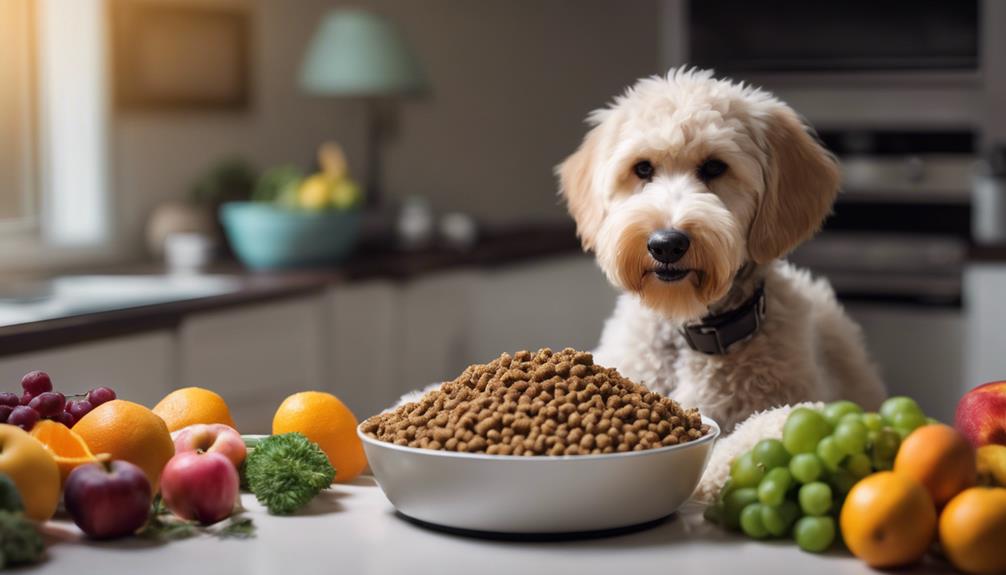
Ensuring optimal health and performance in Shepadoodles hinges on providing a diet rich in high-quality proteins to support their active lifestyle and muscle development. To meet their dietary needs effectively, consider the following recommendations:
- Protein: Shepadoodles require a diet that is abundant in high-quality proteins. Proteins are essential for muscle growth, repair, and overall development. Opt for sources like lean meats, fish, and legumes to ensure they receive an adequate intake of this crucial nutrient.
- Healthy Fats: Incorporating healthy fats into the Shepadoodle's diet is vital for maintaining their energy levels and promoting a shiny coat. Sources of healthy fats include fish oil, flaxseed oil, and coconut oil. These fats also play a role in supporting their skin health and immune function.
- Balanced Nutrition: In addition to proteins and healthy fats, Shepadoodles need a well-rounded diet that includes essential vitamins and minerals. Balanced nutrition is key to their overall health and well-being. Make sure their diet consists of a variety of fresh meats, vegetables, and fruits to provide them with the necessary nutrients for optimal functioning.
Finding a Reputable Breeder

To ensure the health and genetic integrity of Shepadoodles, the first step is selecting a reputable breeder who prioritizes thorough health testing on parent dogs. A reputable breeder recognizes the importance of genetic screening to minimize the risk of passing on hereditary diseases to offspring. Health testing on parent dogs for conditions such as hip dysplasia, progressive retinal atrophy (PRA), arthritis, and epilepsy can significantly reduce the likelihood of these issues manifesting in Shepadoodle puppies.
When searching for a reputable breeder, it is advisable to visit their facilities in person. This allows you to assess the living conditions in which the dogs are raised and evaluate the socialization of the puppies. Responsible breeders maintain open communication with prospective buyers, readily providing information on the lineage of the dogs, health records, and detailed care instructions to ensure the well-being of the puppies.
Choosing a breeder who conducts comprehensive health testing on parent dogs not only safeguards the puppies' health but also contributes to the overall betterment of the Shepadoodle breed. By prioritizing health and genetic integrity through selective breeding practices, reputable breeders play a crucial role in producing healthy, well-adjusted Shepadoodles for loving homes.
Adoption and Rescue Considerations
Considering adoption or rescue for a Shepadoodle can be a rewarding and cost-effective choice for those seeking a loving companion. When looking into adopting a Shepadoodle, there are several key points to keep in mind:
- Rescue Specialization: Consider adopting a Shepadoodle from rescues that specialize in this particular breed. These rescues have a better understanding of Shepadoodle traits and can provide a suitable match for your lifestyle.
- Cost-Effective Option: Adoption fees for Shepadoodles from rescues typically range around $500, offering a more economical choice compared to purchasing from a breeder.
- Health Testing and Socialization: Reputable rescues ensure that Shepadoodle puppies undergo health testing and socialization before adoption. This helps in ensuring that you are bringing home a happy and healthy companion.
Frequently Asked Questions
What Are the Characteristics of a German Shepherd Poodle Mix?
To care for a German Shepherd Poodle mix, address their grooming needs with regular brushing, cater to their high exercise requirements for mental stimulation, and use positive reinforcement training methods. Consistency and patience yield excellent results.
What Is the Personality of a Shepadoodle?
You'll discover that Shepadoodles have a dynamic personality. They excel with proper training and socialization, thriving on mental stimulation and physical exercise. Their temperament is a blend of boldness, protectiveness, athleticism, and creativity, making them a unique and engaging companion.
What Is the History of the Shepadoodle?
Shepadoodles have a fascinating breeding history, originating in the 1960s for military purposes. Their crossbreed popularity is on the rise due to their genetic diversity. This hybrid breed combines the best of German Shepherds and Poodles.
What Is a Belgian Shepherd Mix With Poodle?
A Belgian Shepherd mix with Poodle, also known as a Shepadoodle, combines the Belgian Shepherd's intelligence and loyalty with the Poodle's hypoallergenic coat. The grooming requirements for this poodle crossbreed vary depending on the coat texture and color.
Conclusion
In conclusion, the Shepadoodle breed is a fascinating combination of the intelligent German Shepherd and the hypoallergenic Poodle. Their unique physical characteristics, protective instincts, and energetic nature make them a wonderful addition to any family. With proper care, grooming, and training, Shepadoodles can thrive and bring joy to their owners for many years to come. Consider adopting or rescuing one of these special dogs to experience the love and loyalty they have to offer.
